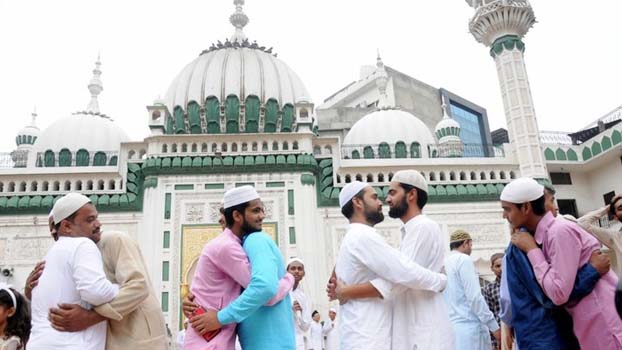The tradition of sacrificing animals on a particular day began with the story of faithful Ibrahim (AS), who was instructed by Allah in his dream to sacrifice his dearest thing. His son was his most important possession. But miraculously enough, when Ibrahim (AS) was about to sacrifice Ismail (AS), Allah spared the boy's life and replaced him with a lamb.
And this is what Ibrahim (AS) ultimately sacrificed. To commemorate this outstanding act of sacrifice (qurbani) by Prophet Ibrahim (AS), cross-sections of people, abled ones to be particular, sacrifice cow, lamb, goat or any other religiously-approved animal on the auspicious day of Eid-ul-Azha and share meat with friends, neighbours, relatives and the needy as instructed by religious scriptures.
Apart from sacrificing animals on the day of Eid-ul-Azha, there are many more lessons to be learnt from this act of slaughtering. The first lesson is that of sacrifice. If we take the act of the prophet into account, then it is easily comprehensible that it is important to take lessons from all that happened to Prophet Ibrahim (AS) and implement those in one’s life rather than confining the occasion to mere festivities.
Allah says clearly in the (Quran 22; 37), “Their flesh and blood does not reach Allah. It is your purity that reaches Him”. Eid-ul-Azha is, therefore, beyond just slaughtering of animals. But, now-a-days we are completely oblivious of the spirit of sacrifice rather we are merely concerned about the literal act of sacrificing animals being unable to comprehend and communicate the true spirit of sacrifice.
We often forget the fact Eid-ul-Azha is basically an occasion meant to remind the Muslims of what one basically is – someone who is supposed to surrender himself along with his soul in the absolute sense to the Almighty Allah.
The true connotation of Eid-ul-Azha lies in our attitude – a state
The occasion is a soft reminder that no matter what his likings and desires are, when Allah’s will is presented before him, as a Muslim it is his supreme duty to forget his own obsessions by slaughtering those and obliterate even the least presence of those materialistic longings with a view to following what the Almighty wants from him.
This perhaps can be described as the most important lesson that Muslims need to internalize during the Qurbani. We are not here to live our lives as we please rather we need to live up to the creator’s expectations and lead life accordingly.
Meanwhile, the true connotation of Eid-ul-Azha lies in our attitude – a state of mind when we are ready to sacrifice our lust dwelling in the back of our minds. Flames of lust could easily lead someone to a state when he/she does not hesitate even for a moment to do something that brings ruination for others.
The latest incidents unearthing the crimes committed by Shahed and Sabrina are stark examples substantiating the damnation lust could bring about in someone’s life. So, this Eid-ul-Azha remind yourself that Qurbani is not about sacrificing an animal at all, rather it’s time to purify our soul by destroying the lust and other worldly pitfalls in one’s character in order to lead a life full of virtues and good deeds. Because it is only the strength and purity of heart that matters to the Almighty, not the sacrificial animal.
The last lesson can be drawn from the way Prophet Ibrahim’s (AS) test comes to an end. Nobody loses at the end – neither the father nor the Almighty. At the end of it all, Prophet Ibrahim (AS) did not lose his son and at the same time ended up pleasing the Almighty.
In the same way, all the sacrifices that we are making in this worldly life are meant to bring about positive outcomes for us all. Verily it is not His intention to see us agonizing or suffering. He only tests us. If we continue to be steadfast in our faith in Him, Allah will make sure that we embrace victory at the end of the day.
So, this Eid-ul-Azha, let us commit to ourselves that we will sacrifice something for Allah’s sake apart from customary animal sacrifice. It has something to do with our desires.
We might not be as strong as Prophet Ibrahim (AS), but at least we can give it a try, beginning with a little sacrifice – sacrifice of a glass of juice to satiate a thirty beggar’s thirst, sacrifice of an extra morsel of our favourite dish to satisfy someone else’s hunger who may be suffering hard owing to coronavirus or anything that we can give up to fulfill someone else’s necessity. This could be a stunning way to make our Eid celebration meaningful in the truest sense.
The writer is a journalist who likes to delve deeper into human psyche with a view to exploring the factors that influence it.















